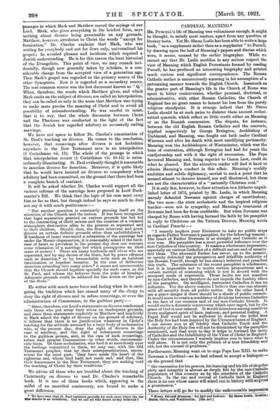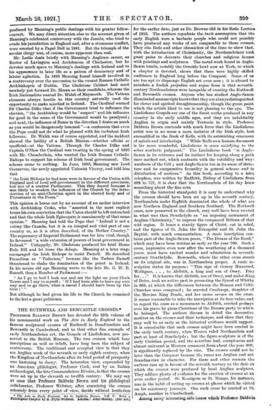CARDINAL MANNING.* MR. PuacELL's life of Manning was voluminous enough,
it might be thought, to satisfy most readers, apart from any question of literary taste. 'Yet Mr. Shane Leslie has been able to write a large book, " as a supplement Lather than as a supplanter " to Purcell, by drawing upon the half of Manning's. papers and diaries which were, it seems, unused by the earlier biographer. While we cannot say that Mr. Leslie modifies in any serious respect the
view of. Manning which Fngligh Protestants formed by reading Purcell, he has produced an interesting biography and printed
much curious and significant correspondence. The Roman
Catholic author is unconsciously amusing, in his assumption a a patronising manner towards the English Church. Inasmuch as
the greater part of Manning's life in the Church of Rome was spent in bitter controversies, whether personal, doctrinal, or administrative, with other Roman Catholics, the Church of
England has no great reason to lament his loss from the purely religious standpoint. It is strange indeed that Mr. Shane Leslie should be at such pains to disinter these ancient ecclesi- astical quarrels, which reflect so little credit either on Manning or on the Romish communion. The dispute, for instance, between the old English Roman Catholics and the converts, typified respectively by George Errington, Archbishop of
Trebizond, and Manning, was fought out both under Cardinal Wiseman and after his death with most unedifying pertinacity.
Manning won the Archbishopric of Westminster, which was, the bone of contention, although Errington had had for years the coadjutorship and with it the right of succession. The Pope
favoured Manning and, being superior to Canon Law, could do what he pleased. But the attentive reader will find it hard to admire Manning's conduct in this affair Manning's worldly ambition and subtle diplomacy, carried to such a point that he seemed.almost to.deceive himself, are well illustrated, but these are not the eharaoteristics of a " naturally .Christian soul."
It is only fair, however, to draw attention to a hitherto unpub- liahed letter of 1875, printed by Mr. Leslie, in which Manning
warmly defended Newman against charges of unorthodoxy.
The two men—the stern ecclesiastic and the inspired religious teacher—were not in sympathy, and Manning's treatment of Newman had been far from creditable. Bat when Newman was charged by Rome with having harmed the faith by his pamphlet in reply to Gladstone on the Vatican Decrees, Manning wrote to Cardinal Franchi :—
" I warmly implore your Eminence to take no public steps as regards Father Newman's pamphlet, for the following reasons : The heart of Father Newman is as straight and Catholic as it ever was. His pamphlet has a most powerful influence over the non-Catholics of this-country. It makes a wholesome impression, especially on various Catholics of a difficult nature and of unsatis- fied ideas. The aforesaid Father has never, up to the present, so openly defended the prerogatives and infallible authority of the Roman Pontiff, though he has always believed and preached this truth. The substance of the recent pamphlet is wholesome, but it is impossible not to notice certain propositions and a certain method of reasoning which is not in accord with the accepted mode of expression. These faults are not manifest to non-Catholics, and therefore do not impede the healthy effect of the pamphlet. On intelligent, instructed Catholics it has no influence. For the above reasons I believe that one can abstain with all security from all public notice. On the other hand, I see a grave danger if there should be a shade of public censure. It would seem to create a semblance of divisions between Catholics in the face of our enemies and of our non-Catholic friends. It would excite a domestic controversy which once raged, but by the grace of God is now calmed. It would introduce among ourselves every malignant spirit of hate, jealousy, and personal feeling. A Papal Bull would not be sufficient to destroy the belief that the Holy See had been inspired by the Ultramontanes of England. I can assure you in all fidelity that Catholic Truth and the ,Authority of the Holy See will not be diminished by the pamphlet mentioned, and that even to-day it helps to forward the unity of Catholics and the Infallibility of the Vicar of Christ in England. Under the circumstances I warmly implore you to leave what is well alone. It is not only the petition of a true friendship and old, but the counsel of prudence."
Furthermore, Manning went on to urge Pope Leo XIII. to make Newman a Cardinal—as he had refused to accept a bishopric — on the ground that
" the veneration for his powers, his learning and his life of singular piety and integrity is almost as .deeply felt by the non-Ciw.thelio population of this country as by the members of the Catholic .Church. In the rise and revival of Catholic faith jn England !there is no one whose name will stand out in history with 80 great a prominence."
These letters wilt go far to.modify the unfavourable impression Henry Edwari•lifannisyj his Zee and Labours. By Shane 'Leslie. London Burns. Oates. and %labourite. [tbs. net.]
produced by Manning's public dealings with his greater fellow- convert. We may direct attention also to the account given of Manning's celebrated controversy with the Jesuits, who tried to evade hiOurisdiction in England and, after a strenuous conflict, were worsted by a Papal Bull in 1881. But the triumph of the secular clergy was, of comae, more apparent than real.
Mr., Leslie deals briefly with Manning'; Anglican- career, as Rector of Lavington and.• Archdeacon of Chichester, but he devotes much space to Manning's dealings with Ireland and to his appearance in later life as a patron of democracy and of labour agitation. In 1885 Manning found himself involved in a controversy over the succession to the vacant Roman Catholic Archbishopric of Dublin. The Gladstone Cabinet had most unwisely put forward Dr. Moran as their candidate, whereas the rrish Nationalists wanted Dr. Walsh of Maynooth. The Vatican elements always hostile to this country naturally used the opportunity to make mischief in Ireland. TheCardinal warned Sir Charles Dilke that if the Government tried to influence the election, " the Archbishop would be suspect' and:his influence for good in -the -sense of the Government would be paralysed ; and next, the-influence-of Rome in the direction I desire as much ea-you would be dangerously lessened "—a confession that even the Pope could not do what he pleased with his turbulent Irish followers. Dr: Walsh was of course appointed, and the incident showed the futility of a British Mission—whether official or unofficial=-at the Vatican. Through Sir Charles Dilke and ' Captain O'Shea the Cardinal was treating in the spring of 1885
with Mr. Chamberlain, who wanted the Irish Roman Catholic BiShops to support his scheme of Irish local government. The scheme came to nothing.- In June, 1885, Manning saw Lord Carnarvon, the newly appointed Unionist Viceroy, and told him that .
" the Irish Bishops he had seen were in favour of the Union with England-and of local seltgovernment in the different provinces, but not of a central Parliament. This they feared' because it was likely to weaken the influence of the Church by the intro- duction of an anti-Christian- spirit in the elected body and of Protestants in the Peers."
This opinion is borne out by an account of an earlier interview with Archbishop Croke, who " asserted in the most explicit terms his own conviction that the Union should be left 'untouched. and that the whole Irish Episcopate is unanimously of that same! opinion." Manning had told the Pope that " Ireland is not a colony like Canada; but: it' is an integral and vital part of one' country or, as it is often described, of the Mother Country."
The snprereacy of Imperial Parliament was for him- vital,- though he favoured " a wide extension of powers of local government in Ireland." Unhappily; Mr: Gladstone produced his fatal Home
Rule Bill and let loose the deluge. Manning at a later stage encouraged the Irish Bishops to resist Parnell. He described Parnellism as " Tudorism," because like the Tudors Parnell threatened to shake the domination of the priest in Ireland.
In his serene old age Manning wrote to the late Mr. G. W. E. Russell, then a Member of Parliament :— " As I go to bed I look out and see the light on your Clock Tower and I say to myself : ' If I had been able to have my own way and to go there, what a reseal I should have been by this time 1 ' " But although he had given his life to the Church he remained to the last a great. politician.



































 Previous page
Previous page